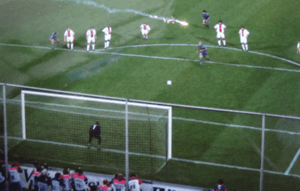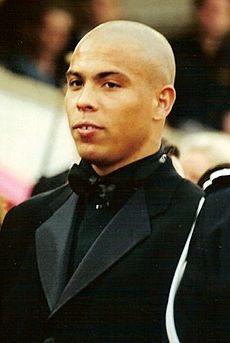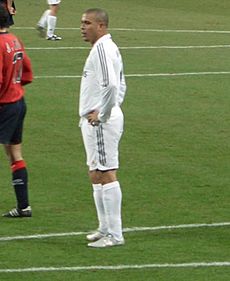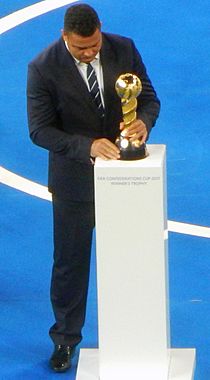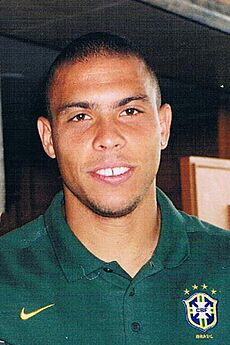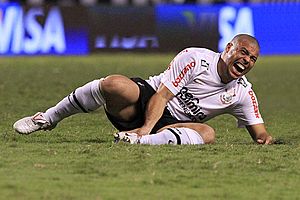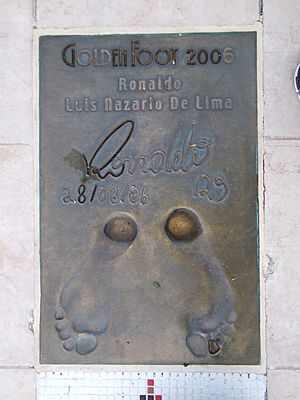Ronaldo (Brazilian footballer) facts for kids
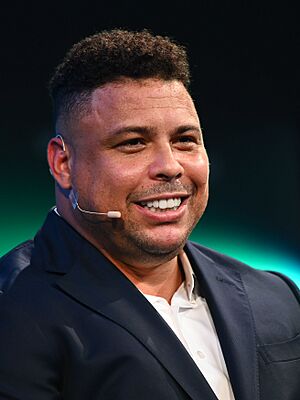
Ronaldo in 2019
|
||||||||||||||||||||||||||||||||||||||||||||||
| Personal information | ||||||||||||||||||||||||||||||||||||||||||||||
|---|---|---|---|---|---|---|---|---|---|---|---|---|---|---|---|---|---|---|---|---|---|---|---|---|---|---|---|---|---|---|---|---|---|---|---|---|---|---|---|---|---|---|---|---|---|---|
| Full name | Ronaldo Luís Nazário de Lima | |||||||||||||||||||||||||||||||||||||||||||||
| Date of birth | 18 September 1976 | |||||||||||||||||||||||||||||||||||||||||||||
| Place of birth | Itaguaí, Brazil | |||||||||||||||||||||||||||||||||||||||||||||
| Height | 1.83 m (6 ft 0 in) | |||||||||||||||||||||||||||||||||||||||||||||
| Position(s) | Striker | |||||||||||||||||||||||||||||||||||||||||||||
| Youth career | ||||||||||||||||||||||||||||||||||||||||||||||
| 1990–1993 | São Cristóvão | |||||||||||||||||||||||||||||||||||||||||||||
| Senior career* | ||||||||||||||||||||||||||||||||||||||||||||||
| Years | Team | Apps | (Gls) | |||||||||||||||||||||||||||||||||||||||||||
| 1993–1994 | Cruzeiro | 34 | (34) | |||||||||||||||||||||||||||||||||||||||||||
| 1994–1996 | PSV | 46 | (42) | |||||||||||||||||||||||||||||||||||||||||||
| 1996–1997 | Barcelona | 37 | (34) | |||||||||||||||||||||||||||||||||||||||||||
| 1997–2002 | Inter Milan | 68 | (49) | |||||||||||||||||||||||||||||||||||||||||||
| 2002–2007 | Real Madrid | 127 | (83) | |||||||||||||||||||||||||||||||||||||||||||
| 2007–2008 | AC Milan | 20 | (9) | |||||||||||||||||||||||||||||||||||||||||||
| 2009–2011 | Corinthians | 52 | (29) | |||||||||||||||||||||||||||||||||||||||||||
| Total | 384 | (280) | ||||||||||||||||||||||||||||||||||||||||||||
| International career | ||||||||||||||||||||||||||||||||||||||||||||||
| 1993 | Brazil U17 | 7 | (5) | |||||||||||||||||||||||||||||||||||||||||||
| 1996 | Brazil U23 | 8 | (6) | |||||||||||||||||||||||||||||||||||||||||||
| 1994–2011 | Brazil | 98 | (62) | |||||||||||||||||||||||||||||||||||||||||||
|
Medal record
|
||||||||||||||||||||||||||||||||||||||||||||||
| *Club domestic league appearances and goals | ||||||||||||||||||||||||||||||||||||||||||||||
Ronaldo Luís Nazário de Lima (born 18 September 1976), known simply as Ronaldo, is a Brazilian retired professional footballer who played as a striker. He is the owner of the Spanish club Real Valladolid. Fans and experts call him O Fenômeno ('The Phenomenon') and R9. Many people think he is one of the greatest players of all time.
Ronaldo was a new kind of striker. He inspired many young players who came after him. He won the FIFA World Player of the Year award three times and the Ballon d'Or award twice.
Ronaldo started his career at Cruzeiro in Brazil. He then moved to Europe, playing for big clubs like PSV, Barcelona, Inter Milan, and Real Madrid. He broke the world transfer record twice. By the time he was 23, he had scored over 200 goals. Sadly, serious knee injuries made him miss almost three years of football. He retired in 2011 after more injuries.
For the Brazil, Ronaldo played 98 games and scored 62 goals. He was part of the team that won the 1994 FIFA World Cup. At the 1998 FIFA World Cup, he was the best player but had a health scare before the final. In the 2002 FIFA World Cup, he made an amazing comeback. He scored two goals in the final to help Brazil win. He was the top scorer of the tournament.
Ronaldo was very famous during his career. Pelé named him in the FIFA 100 list of the greatest living players. He is in the Hall of Fame for Brazil, Italy, Inter Milan, and Real Madrid. After retiring, he became the main owner of Real Valladolid in 2018.
Contents
Early Life
Ronaldo was born on 18 September 1976, in a suburb of Rio de Janeiro, Brazil. His parents separated when he was 11. He soon left school to focus on becoming a football player. He played football on the streets and was very talented.
At age 12, he joined a futsal (a type of indoor football) team. In his first season, he scored a record 166 goals. Ronaldo said that futsal was his "first love" and helped him develop his skills.
A famous former Brazilian player, Jairzinho, saw Ronaldo play and recognized his talent. He helped the 16-year-old Ronaldo join the club Cruzeiro.
Club Career
Cruzeiro
Ronaldo quickly became a star at Cruzeiro. In his first year, he made his professional debut. He scored 44 goals in 47 games over two seasons. He helped Cruzeiro win the Copa do Brasil in 1993 and a state championship in 1994. His amazing performances got the attention of big European clubs.
PSV Eindhoven
After the 1994 FIFA World Cup, Ronaldo joined the Dutch club PSV. In his first season, he was the top scorer in the league with 30 goals. People were amazed by his speed and skill. Future teammate Luis Enrique said, "He's the most spectacular player I've ever seen."
A knee injury affected his second season, but he still scored 19 goals in 21 games. In his two years at PSV, he scored 54 goals in 58 games.
Barcelona
In 1996, Barcelona paid a world-record fee of $19.5 million to sign Ronaldo. In his only season there, he was unstoppable. He scored 47 goals in 49 games. He helped Barcelona win three trophies, including the 1996–97 UEFA Cup Winners' Cup.
His most famous goal was against Compostela. He got the ball in his own half, dodged several defenders, and scored. The Barcelona manager, Bobby Robson, put his head in his hands in disbelief. At the end of 1996, at age 20, Ronaldo became the youngest player to win FIFA World Player of the Year.
Inter Milan
In 1997, Inter Milan paid another world-record fee ($27 million) to sign Ronaldo. He quickly adapted to the tough Italian league, scoring 25 goals in his first season. He won his second FIFA World Player of the Year award and the Ballon d'Or.
In the 1998 UEFA Cup Final, he scored a famous goal against Lazio. He faked out the goalkeeper without touching the ball and then scored easily. However, his time at Inter was marked by serious injuries. In November 1999, he hurt his knee. In his first game back in April 2000, he injured it again. The injury was so bad it was called "the worst football injury" his doctor had ever seen.
He missed almost two full seasons. After his comeback, he helped Brazil win the 2002 World Cup and then moved to Real Madrid.
Real Madrid
In 2002, Ronaldo joined Real Madrid for €46 million. He was part of the Galácticos team, which included other stars like Zinedine Zidane and David Beckham. He scored twice in his first game. He won the La Liga title in his first season.
One of his greatest moments was a hat-trick against Manchester United at their stadium, Old Trafford. When he left the field, fans from both teams gave him a standing ovation.
In his later seasons at Madrid, Ronaldo struggled with more injuries and weight issues. Still, he scored over 100 goals for the club. His teammates praised him, with Zidane calling him "the best player I ever played with or against."
Later Career and Retirement
Ronaldo later played for AC Milan and the Brazilian club Corinthians. He continued to score goals but was always fighting against injuries.
On 14 February 2011, Ronaldo announced his retirement from football. He said that his body could no longer keep up with the pain from his many injuries. He explained he had a condition called hypothyroidism, which made it hard to control his weight. "Mentally I wanted to continue," he said, "but I have to acknowledge that I lost to my body."
International Career
Ronaldo made his debut for Brazil in 1994. At just 17, he was part of the squad that won the 1994 FIFA World Cup, but he did not play.
1998 World Cup: The Mystery
By the 1998 FIFA World Cup, Ronaldo was seen as the best player in the world. He scored four goals to help Brazil reach the final against France. But hours before the final, he suffered a convulsive fit.
He was initially taken out of the lineup. But just before the game, he said he felt fine and was put back in. He played poorly, and Brazil lost 3–0. The incident remains one of football's biggest mysteries. Despite the final, he was named the best player of the tournament.
2002 World Cup: The Comeback
After his terrible knee injuries, many thought Ronaldo's career was over. But he made a stunning comeback for the 2002 FIFA World Cup. He led Brazil to victory, scoring eight goals to win the Golden Boot.
In the final against Germany, he scored both goals in a 2–0 win. This victory was seen as his redemption. He won his third FIFA World Player of the Year award for his incredible return.
2006 World Cup and Legacy
At the 2006 FIFA World Cup, Ronaldo scored his 15th World Cup goal. This made him the tournament's all-time top scorer at the time. (The record was later broken by Miroslav Klose.)
Ronaldo retired from international football in 2011. He scored 62 goals for Brazil, making him the country's third-highest goalscorer.
Style of Play
Ronaldo is considered one of the most complete forwards ever. He was incredibly fast, powerful, and skillful. He was famous for his dribbling at high speed, his step over move, and his calm finishing.
His coach at Barcelona, Bobby Robson, said, "He was the fastest thing I've ever seen running with the ball." Many great players, like Lionel Messi and Zlatan Ibrahimović, have called Ronaldo the best striker they ever saw. He changed the striker position, inspiring a generation of players who came after him.
Life After Football
After retiring, Ronaldo has stayed involved in football. In 2018, he became the majority owner of the Spanish club Real Valladolid. He also bought a controlling stake in his first club, Cruzeiro, in 2021, though he sold it in 2024.
Ronaldo has also worked as a Goodwill Ambassador for the United Nations Development Programme. He continues to be a global icon for the sport.
Images for kids
Career statistics
Club
| Club | Season | League | State league | National cup | Continental | Other | Total | |||||||
|---|---|---|---|---|---|---|---|---|---|---|---|---|---|---|
| Division | Apps | Goals | Apps | Goals | Apps | Goals | Apps | Goals | Apps | Goals | Apps | Goals | ||
| Cruzeiro | 1993 | Série A | 14 | 12 | 2 | 0 | — | 4 | 8 | 1 | 0 | 21 | 20 | |
| 1994 | Série A | — | 18 | 22 | — | 8 | 2 | — | 26 | 24 | ||||
| Total | 14 | 12 | 20 | 22 | — | 12 | 10 | 1 | 0 | 47 | 44 | |||
| PSV | 1994–95 | Eredivisie | 33 | 30 | — | 1 | 2 | 2 | 3 | — | 36 | 35 | ||
| 1995–96 | Eredivisie | 13 | 12 | — | 3 | 1 | 5 | 6 | — | 21 | 19 | |||
| Total | 46 | 42 | — | 4 | 3 | 7 | 9 | — | 57 | 54 | ||||
| Barcelona | 1996–97 | La Liga | 37 | 34 | — | 4 | 6 | 7 | 5 | 1 | 2 | 49 | 47 | |
| Inter Milan | 1997–98 | Serie A | 32 | 25 | — | 4 | 3 | 11 | 6 | — | 47 | 34 | ||
| 1998–99 | Serie A | 19 | 14 | — | 2 | 0 | 6 | 1 | 1 | 0 | 28 | 15 | ||
| 1999–2000 | Serie A | 7 | 3 | — | 1 | 0 | — | — | 8 | 3 | ||||
| 2000–01 | Serie A | 0 | 0 | — | 0 | 0 | 0 | 0 | — | 0 | 0 | |||
| 2001–02 | Serie A | 10 | 7 | — | 1 | 0 | 5 | 0 | — | 16 | 7 | |||
| Total | 68 | 49 | — | 8 | 3 | 22 | 7 | 1 | 0 | 99 | 59 | |||
| Real Madrid | 2002–03 | La Liga | 31 | 23 | — | 1 | 0 | 11 | 6 | 1 | 1 | 44 | 30 | |
| 2003–04 | La Liga | 32 | 24 | — | 5 | 2 | 9 | 4 | 2 | 1 | 48 | 31 | ||
| 2004–05 | La Liga | 34 | 21 | — | 1 | 0 | 10 | 3 | — | 45 | 24 | |||
| 2005–06 | La Liga | 23 | 14 | — | 2 | 1 | 2 | 0 | — | 27 | 15 | |||
| 2006–07 | La Liga | 7 | 1 | — | 2 | 1 | 4 | 2 | — | 13 | 4 | |||
| Total | 127 | 83 | — | 11 | 4 | 36 | 15 | 3 | 2 | 177 | 104 | |||
| AC Milan | 2006–07 | Serie A | 14 | 7 | — | — | — | — | 14 | 7 | ||||
| 2007–08 | Serie A | 6 | 2 | — | — | — | — | 6 | 2 | |||||
| Total | 20 | 9 | — | — | — | — | 20 | 9 | ||||||
| Corinthians | 2009 | Série A | 20 | 12 | 10 | 8 | 8 | 3 | — | — | 38 | 23 | ||
| 2010 | Série A | 11 | 6 | 9 | 3 | — | 7 | 3 | — | 27 | 12 | |||
| 2011 | Série A | — | 2 | 0 | — | 2 | 0 | — | 4 | 0 | ||||
| Total | 31 | 18 | 21 | 11 | 8 | 3 | 9 | 3 | — | 69 | 35 | |||
| Career total | 343 | 247 | 41 | 33 | 35 | 19 | 93 | 49 | 6 | 4 | 518 | 352 | ||
International
| Team | Year | Competitive | Friendly | Total | |||
|---|---|---|---|---|---|---|---|
| Apps | Goals | Apps | Goals | Apps | Goals | ||
| Brazil | 1994 | — | 4 | 1 | 4 | 1 | |
| 1995 | 1 | 0 | 5 | 3 | 6 | 3 | |
| 1996 | — | 4 | 5 | 4 | 5 | ||
| 1997 | 11 | 9 | 9 | 6 | 20 | 15 | |
| 1998 | 7 | 4 | 3 | 1 | 10 | 5 | |
| 1999 | 6 | 5 | 4 | 2 | 10 | 7 | |
| 2000 | — | — | — | ||||
| 2001 | — | — | — | ||||
| 2002 | 7 | 8 | 5 | 3 | 12 | 11 | |
| 2003 | 4 | 3 | 4 | 0 | 8 | 3 | |
| 2004 | 7 | 6 | 4 | 0 | 11 | 6 | |
| 2005 | 4 | 1 | 1 | 0 | 5 | 1 | |
| 2006 | 5 | 3 | 2 | 2 | 8 | 5 | |
| 2007 | — | — | — | ||||
| 2008 | — | — | — | ||||
| 2009 | — | — | — | ||||
| 2010 | — | — | — | ||||
| 2011 | — | 1 | 0 | 1 | 0 | ||
| Total | 52 | 39 | 46 | 23 | 98 | 62 | |
Honours
Cruzeiro
- Campeonato Mineiro: 1994
PSV Eindhoven
- KNVB Cup: 1995–96
Barcelona
- Copa del Rey: 1996–97
- Supercopa de España: 1996
- UEFA Cup Winners' Cup: 1996–97
Inter Milan
- UEFA Cup: 1997–98
Real Madrid
- La Liga: 2002–03
- Supercopa de España: 2003
- Intercontinental Cup: 2002
Corinthians
- Campeonato Paulista: 2009
- Copa do Brasil: 2009
Brazil
- FIFA World Cup: 1994, 2002; runner-up: 1998
- Copa América: 1997, 1999; runner-up: 1995
- FIFA Confederations Cup: 1997
- Olympic Bronze Medal: 1996
Individual
- FIFA World Player of the Year: 1996, 1997, 2002
- Ballon d'Or: 1997, 2002
- World Soccer magazine World Player of the Year: 1996, 1997, 2002
- European Golden Shoe: 1996–97
- Pichichi Trophy (La Liga top scorer): 1996–97, 2003–04
- FIFA World Cup Golden Ball (Best player): 1998
- FIFA World Cup Golden Shoe (Top scorer): 2002
- FIFA 100 (List of greatest living players by Pelé)
- Italian Football Hall of Fame: 2015
- Ballon d'Or Dream Team (All-time greatest XI): 2020
See also
 In Spanish: Ronaldo para niños
In Spanish: Ronaldo para niños
- List of most expensive association football transfers
- List of men's footballers with 50 or more international goals
 | Calvin Brent |
 | Walter T. Bailey |
 | Martha Cassell Thompson |
 | Alberta Jeannette Cassell |


